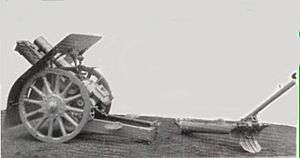Skoda 100 mm Model 1916
| 10 cm Gebirgshaubitze M. 16 | |
|---|---|
 | |
| Type | Mountain gun |
| Place of origin | Austria-Hungary |
| Service history | |
| In service | 1916-1945 |
| Used by |
|
| Wars | World War I, World War II |
| Production history | |
| Designer | Skoda |
| Manufacturer | Skoda |
| Produced | 1915—18 |
| Variants | 10.5 cm Gebirgshaubitze M. 16(T) |
| Specifications | |
| Weight | 1,235 kg (2,723 lb) |
| Barrel length | 1.93 m (6 ft 4 in) L/19 |
|
| |
| Shell weight |
16 kg (35 lb) (Czech) 13.4 kg (30 lb) (Italian) |
| Caliber | 100 millimetres (3.9 in) |
| Carriage | box trail |
| Elevation | -8° to +70° |
| Traverse | 5.5° |
| Muzzle velocity |
341 m/s (1,120 ft/s) (Czech) 407 m/s (1,340 ft/s) (Italian) |
| Effective firing range | 7,090 m (7,750 yd) (Czech) |
| Maximum firing range | 8,490 m (9,280 yd) (Italian) |
The Skoda 100 mm Model 1916 (100 mm M.16) was a mountain howitzer used by Austria-Hungary during World War I. The Turks used a 105 mm variant, the M.16(T). The Wehrmacht redesignated this as the 10 cm GebH 16 or 16(ö). Guns acquired from Italy, after 1943, were known as 10 cm GebH 316(i); those acquired from Czechoslovakia were 10 cm GebH 16(t). The Italians referred to weapons gained either through capture or reparations as the Obice da 100/17 modello 16. The gun could be broken into three sections, intended for towing by two animal carts. The gun crew was protected by a gun shield. The Italians used lighter shells than the Czechs, which accounts for the greater range and muzzle velocity of their guns.
Notes
References
- Chamberlain, Peter and Gander, Terry. Infantry, Mountain and Airborne Guns. New York: Arco, 1975
- Gander, Terry and Chamberlain, Peter. Weapons of the Third Reich: An Encyclopedic Survey of All Small Arms, Artillery and Special Weapons of the German Land Forces 1939-1945. New York: Doubleday, 1979 ISBN 0-385-15090-3
External links
![]() Media related to Skoda 100 mm Model 1916 at Wikimedia Commons
Media related to Skoda 100 mm Model 1916 at Wikimedia Commons